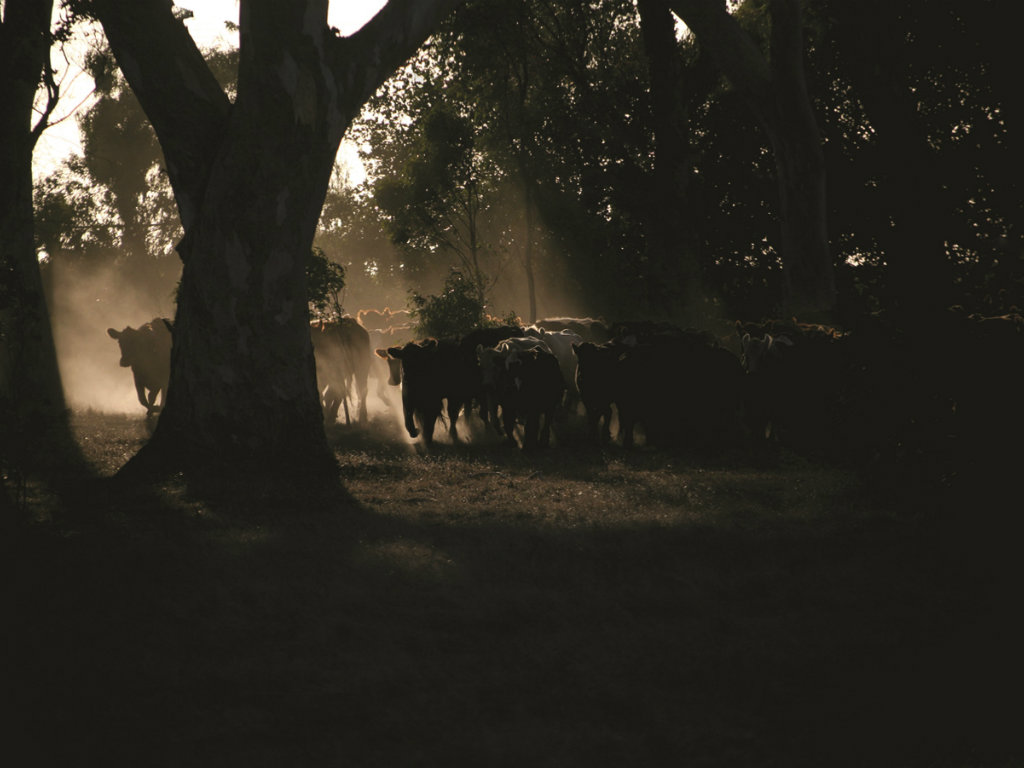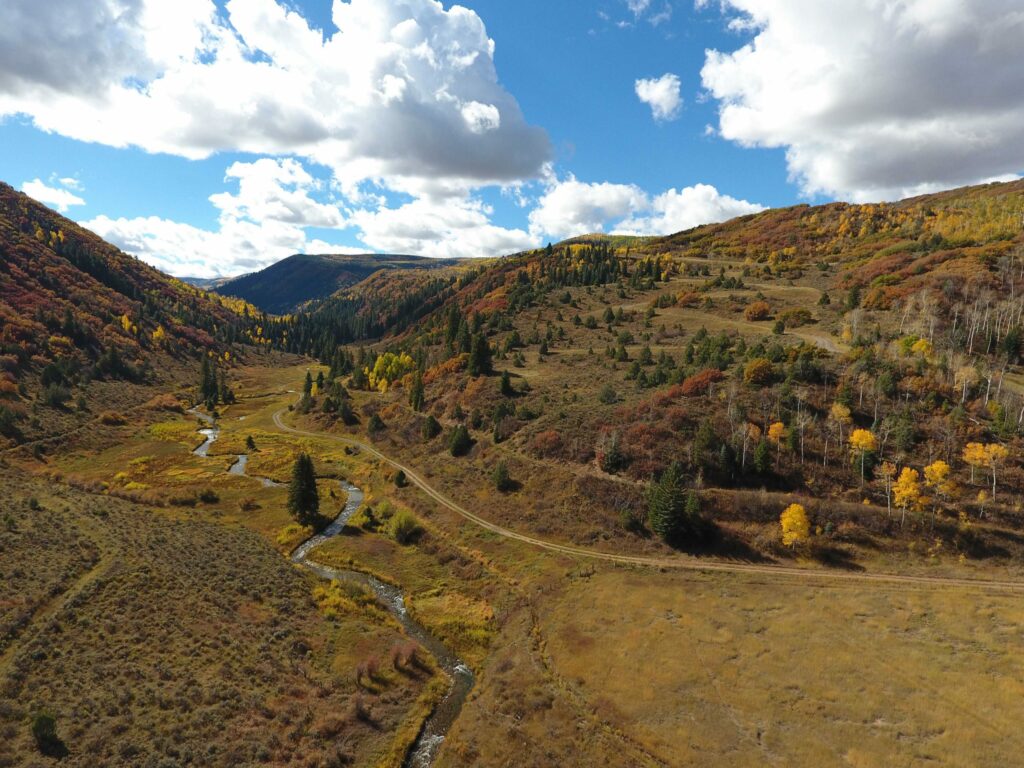Timber owners turn to Clemson University to steward special places.
When Jo Claire Hanvey Hickson was a child, there were few things she enjoyed more than spending time on a timber tract her family owned in rural McCormick County, South Carolina. Located 15 miles from where she grew up and three miles from her grandparents’ farm, the 3,000-acre parcel had been in her family since the late 1800s when it was acquired by her great-grandfather.
She describes the property as a park-like setting, with woods to explore and streams to cross and surprises at every turn.
“We would pick pecans to sell, collect muscadine, pick the fruit off an old pear tree – it was just like grazing,” she recalls.
“We just loved being there.”
These experiences in rural South Carolina created a lifelong connection to the outdoors, and eventually led her to pursue a career in landscape architecture.
Over the years, her family’s land was divided again and again. Given her interest in native trees, she and her husband, Dr. Harry Hickson, opted to turn their 163-acre parcel into a working timber site. With no children, the Hicksons eventually began thinking about who would care for the land as much as they did.
“Lands that are not interrupted by roads and broken into small parcels are significant to the health of wildlife habitats,” she says. “So instead of dividing it among 10 nieces and nephews, we thought it was better to keep it intact.”
Hickson has strong family ties to nearby Clemson University. Her great-uncles played on Clemson’s first football team, one of them under Coach John Heisman. Her father, all of her uncles, and a niece graduated from Clemson. Her mother worked at the university as a home economist. Back in the day, her brother Hal was Clemson’s football team manager. Currently, he is the farm manager at Clemson’s Coastal Research and Education Center. Knowing that the university had strong forestry and agriculture programs, she reached out for suggestions about what to do with her timber tract. Little did she realize that she was poised to enhance her family’s tradition of supporting one of the country’s most selective public research universities.
In 2011, the Hicksons were among the very first to donate their land to Clemson’s Timberlands Legacy Program. The program, which was launched four years ago, is based on successful models already in place at several land-grant colleges, including Mississippi State.
“When we first created the Timberlands Legacy Program, we were just coming out of the Great Recession,” says Laura Haselden, the Director of Real Estate with the Clemson University Real Estate Foundation (CUREF). “Our thoughts were that people might be more land rich than anything else, so it was an easier way for them to give.”
The program is a good fit for Clemson. The university itself was conceived through a bequest from Thomas Green Clemson, who donated his family’s Fort Hill estate and other assets to the State of South Carolina. It was Clemson’s wish to utilize his family’s cherished lands to establish a college that focused on the teaching of agriculture.
The similarity of Clemson’s bequest to the Timberlands Legacy Program is quite remarkable. Through outright or planned gifts, land is donated to the CUREF, which assumes the management, fees, and taxes. Revenues from timber harvests, hunting leases, and other income streams support scholarships, research, and other funding needs. Donors can specify particular programs, too.
“Land is so personal. It’s not like cash gifts or stock donations that may generate returns faster. It’s more of a marathon as opposed to a sprint,” Haselden says. “Our goal is to reach those donors who have strong ties to their land and want to see it maintained as well as help students and future generations through education.” Haselden adds that donations to the program don’t necessarily require forfeiture of ownership. They can also be made in the form of a percentage of timber sales, timber rights, or hunting lease revenues.
Timber legacy programs are proving more and more popular, especially for those without heirs. Others whose children have little interest in managing timberland also find the programs a compelling option.
That was exactly the case with Knowlton Johnson, a 1964 graduate of Clemson’s forestry program. His gift, a legacy dedicated to his parents, Hazel and N.W. Johnson, was a 227-acre family farm.
“In my case, I conceptualized Clemson as family,” he says. “I have two sons, urbanites with careers, and the only thing they could do is sell it off. That would defeat the purpose.”
Although he was initially drawn to forestry, Knowlton ended up earning a PhD in social science from Michigan State University. He subsequently worked as a professor at the University of Maryland, the University of Alaska Anchorage, and the University of Louisville. In 1999, he started his own research firm. Eight years ago, he moved back to the South and started a tree farm on the land that was passed down to him. Although the Johnson Experimental Forest has not yet been deeded to the CUREF, students and faculty are already benefitting from it.
“Since 2013, two Clemson forestry management classes have spent weekends on the property working on projects; a horticulture class spent the day designing a parking lot and bird sanctuary; a deer study has been conducted; and one student used the land for studies in his master’s thesis,” Knowlton says.
Thanks to his renewed relationship with Clemson, Knowlton is also benefitting: talented forestry and wildlife students are working on specific projects and management plans while the land is still in his name.
“It’s a specialized piece of property, so this might not have been a good fit for a university without a forestry department,” he says. “My goal is for it to be an avenue for students to have experiential education to go along with classroom studies.”
When the time comes for Clemson to take title to the land, Knowlton has designated forestry programs as the beneficiary. He has also put a conservation easement in place. “If Clemson should decide it’s not profitable, they can’t sell it off for development. It has to be used as a tree farm.”
Jo Hickson and Knowlton Johnson have chosen a path that aligns their deep connections to their land and their families’ legacies with a like-minded steward.
“Clemson’s goals and my goals for the property coincide,” Hickson says. “And since we don’t have children, we see it as a living legacy as a forest, but also for the education of our youth.”





